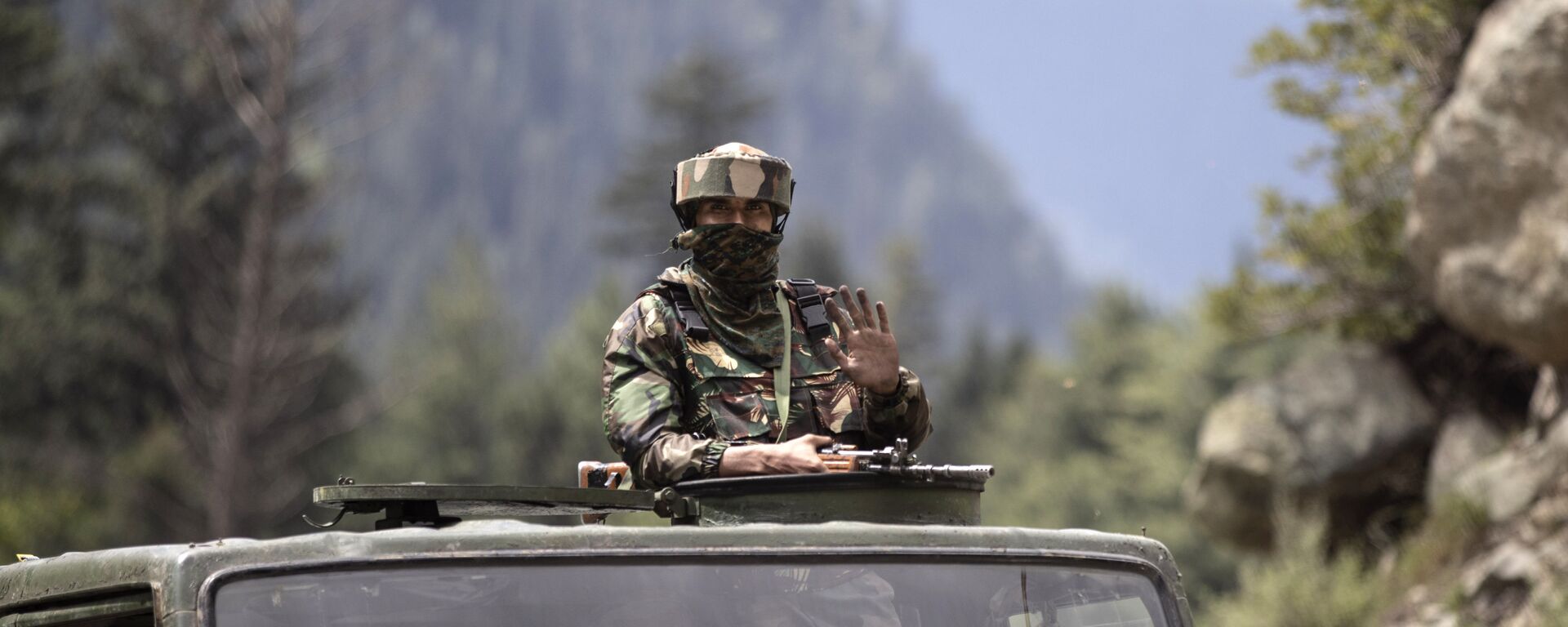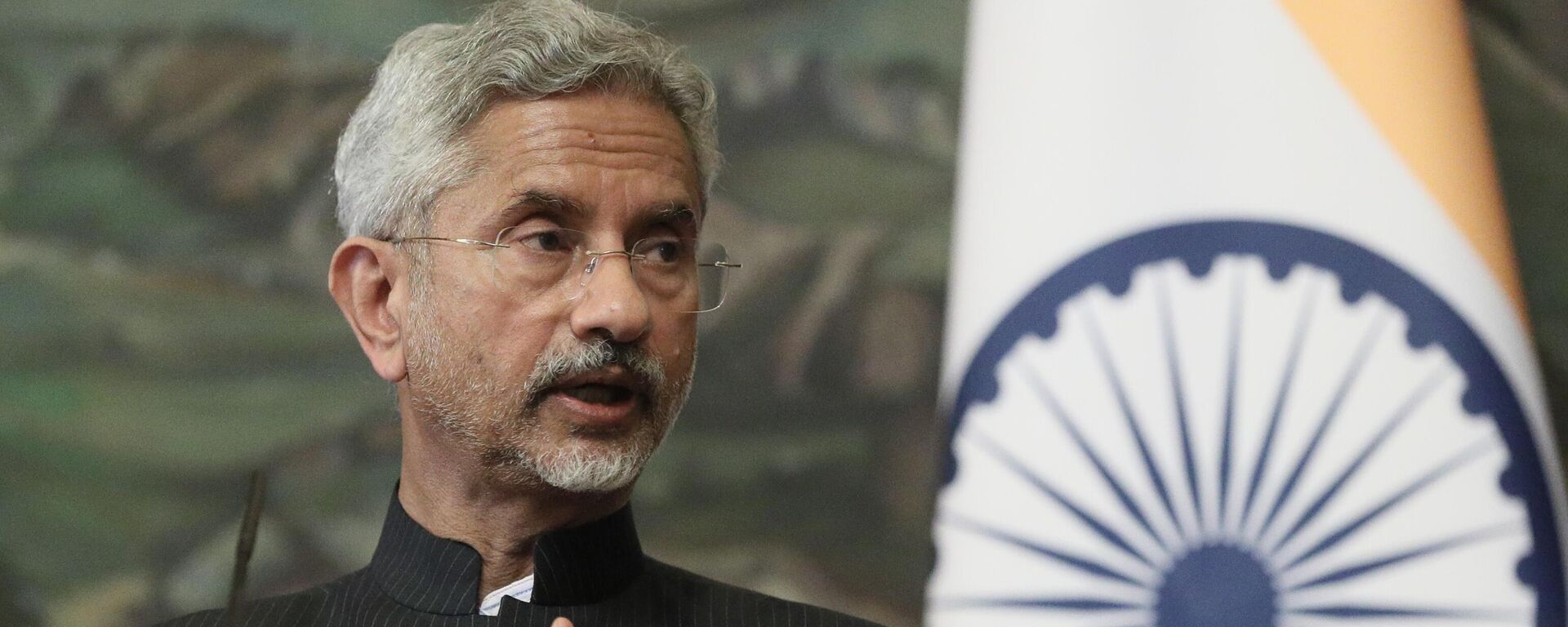https://sputnikglobe.com/20220909/ex-indian-diplomats-spell-out-new-delhis-core-priorities-for-sco-summit-in-uzbekistan-1100611972.html
Ex-Indian Diplomats Spell Out New Delhi’s 'Core Priorities' For SCO Summit in Uzbekistan
Ex-Indian Diplomats Spell Out New Delhi’s 'Core Priorities' For SCO Summit in Uzbekistan
Sputnik International
Indian Prime Minister Narendra Modi, Chinese President Xi Jinping, and Russian President Vladimir Putin are all expected to attend the Shanghai Cooperation... 09.09.2022, Sputnik International
2022-09-09T19:01+0000
2022-09-09T19:01+0000
2022-12-08T16:36+0000
india
shanghai cooperation organisation (sco)
taliban
pakistan
narendra modi
afghanistan war
https://cdn1.img.sputnikglobe.com/img/103684/93/1036849373_0:0:4604:2591_1920x0_80_0_0_6e7cef0db44a66cfd234b50828a0874c.jpg
Former Indian diplomats have said that the situation in Afghanistan, connectivity, and counter-terrorism cooperation should be the three “core priorities” for New Delhi when Prime Minister Narendra Modi attends the SCO leaders’ summit next week.Ashok Sajjanhar, a former Indian ambassador to Kazakhstan, Sweden, and Latvia, noted that all “principal actors” of the region will be involved in the summit, including Iranian President Ebrahim Raisi. Iran is expected to be formally enrolled as the ninth member of the SCO during the summit.Sajjanhar strongly believes that the Indian side will try to convince other SCO states about the benefits of greater trade if the New Delhi-backed Chabahar port is connected to the 7,200-kilometre International North South Transport Corridor (INSTC). The multimodal transport corridor begins in Russia and is intended to connect it to India, passing through Central Asian countries.Prime Minister Narendra Modi, while addressing the plenary session of the Eastern Economic Forum last week, said that the INSTC will “play an important role in the development of our relations in the future.”Pankaj Saran, India’s former deputy National Security Advisor (NSA) and formerly an envoy to Moscow, also believes that it would be “difficult to realize our ambitions” of boosting trade through Central Asia unless New Delhi had the “requisite connectivity.”Major countries such as India and China have not only avoided Western sanctions against Moscow in the wake of Russia’s special military operation in Ukraine, but even expanded cooperation in areas such as energy.India’s Concerns in AfghanistanBoth former diplomats also agreed that working towards “ensuring peace and security” in Afghanistan was also a concern for India, which has also been stated by the Indian leadership on several occasions since the Taliban* stormed to power in Kabul last August.Sajjanhar said that the UN Security Council resolution on Afghanistan adopted last August under India’s rotating presidency would serve as a “template” for New Delhi. The UNSC resolution said that the territory of Afghanistan can’t be used for “sheltering, training, planning or financing terrorist acts," in line with the Taliban’s commitment during the Doha Peace negotiations.Russia and China abstained from voting on the resolution at the time.Former Indian diplomat Saran underlines that the SCO summit will be the first leadership-level meeting since the Taliban came to power.Saran said that the "Delhi Declaration" adopted after the first-ever India-Central Asia leaders' summit in New Delhi this January would serve as a reference point for Indian policy towards Afghanistan.The Delhi Declaration reaffirmed that Afghan territory shouldn’t be used for plotting terror acts and urged the Taliban to crack down on terrorist groups. The governments of India and central Asian countries also called for urgent humanitarian aid to the Afghan population.Counter-Terror CooperationSaran also highlighted that expanded counter terror cooperation among the SCO member states is also one of the key priorities for New Delhi going into next week’s summit.“There should be treatment of terrorist groups such as Lashkar-e-Toiba (LeT) and Jaish-e-Mohammad (JeM) in Afghanistan,” Saran said. The two terrorist groups have claimed responsibility for most of the major terrorist incidents in India in the recent past.Saran noted that the Regional Anti-Terrorist Structure (RATS), a permanent SCO sub-grouping, has emerged as a key discussion platform on terrorist threats from Afghanistan. RATS held its last meeting in New Delhi in May this year.The ex-ambassador notes that besides India-centric terrorist groups, global terror groups such as Daesh** and al-Qaeda** are also present in Afghanistan. He said the presence of Daesh should be a concern to all of Afghanistan’s neighbors.Saran noted that besides engaging with regional states within the SCO framework, New Delhi must also enhance counter-terrorism cooperation at a bilateral level.He said that the SCO will serve as a platform to engage with other leaders in the grouping on the sidelines.*The Taliban is under UN sanctions over terrorist activities**Terrorist organizations banned in Russia and many other countries
https://sputnikglobe.com/20220729/irans-accession-to-sco-will-increase-groupings-influence-globally-indian-fm-says-1097938795.html
https://sputnikglobe.com/20210831/jem-terror-activites-may-escalate-in-kashmir-after-meeting-with-taliban-indian-intel-report-says-1083759938.html
pakistan
Sputnik International
feedback@sputniknews.com
+74956456601
MIA „Rosiya Segodnya“
2022
News
en_EN
Sputnik International
feedback@sputniknews.com
+74956456601
MIA „Rosiya Segodnya“
Sputnik International
feedback@sputniknews.com
+74956456601
MIA „Rosiya Segodnya“
india, shanghai cooperation organisation (sco), taliban, pakistan, narendra modi, afghanistan war
india, shanghai cooperation organisation (sco), taliban, pakistan, narendra modi, afghanistan war
Ex-Indian Diplomats Spell Out New Delhi’s 'Core Priorities' For SCO Summit in Uzbekistan
19:01 GMT 09.09.2022 (Updated: 16:36 GMT 08.12.2022) Indian Prime Minister Narendra Modi, Chinese President Xi Jinping, and Russian President Vladimir Putin are all expected to attend the Shanghai Cooperation Organization (SCO) summit in Samarkand, Uzbekistan on September 15-16. This will be the first such in-person meeting of the leaders of the Beijing-headquartered grouping since 2019.
Former Indian diplomats have said that the situation in Afghanistan, connectivity, and counter-terrorism cooperation should be the three “core priorities” for New Delhi when Prime Minister Narendra Modi attends the SCO leaders’ summit next week.
Ashok Sajjanhar, a former Indian ambassador to Kazakhstan, Sweden, and Latvia, noted that all “principal actors” of the region will be involved in the summit, including Iranian President Ebrahim Raisi. Iran is expected to be formally enrolled as the ninth member of the SCO during the summit.
“One of India’s concerns has been that it hasn’t been able to reach the Central Asian countries… Pakistan hasn’t allowed India to access Afghanistan and Central Asia through the land route,” Sajjanhar told a webinar titled "SCO: Geopolitical Shifts—The Next Steps" organized by the India Writes Network.
Sajjanhar strongly believes that the Indian side will try to convince other SCO states about the benefits of greater trade if the New Delhi-backed Chabahar port is connected to the 7,200-kilometre International North South Transport Corridor (INSTC). The multimodal transport corridor begins in Russia and is intended to connect it to India, passing through Central Asian countries.
Prime Minister Narendra Modi, while addressing the plenary session of the
Eastern Economic Forum last week, said that the INSTC will “play an important role in the development of our relations in the future.”
Pankaj Saran, India’s former deputy National Security Advisor (NSA) and formerly an envoy to Moscow, also believes that it would be “difficult to realize our ambitions” of boosting trade through Central Asia unless New Delhi had the “requisite connectivity.”
“The importance of INSTC and Chabahar have increased after the Ukraine crisis,” Saran states, adding that both the connectivity projects could “facilitate trade” among developing countries, or the "Global South."
Major countries such as India and China have not only avoided Western sanctions against Moscow in the wake of Russia’s special military operation in Ukraine, but even expanded cooperation in areas such as energy.
India’s Concerns in Afghanistan
Both former diplomats also agreed that working towards “ensuring peace and security” in Afghanistan was also a concern for India, which has also been stated by the Indian leadership on several occasions since the Taliban* stormed to power in Kabul last August.
Sajjanhar said that the UN Security Council resolution on Afghanistan adopted last August under India’s rotating presidency would serve as a “template” for New Delhi. The UNSC resolution said that the territory of Afghanistan can’t be used for “sheltering, training,
planning or financing terrorist acts," in line with the Taliban’s commitment during the Doha Peace negotiations.
Russia and China abstained from voting on the resolution at the time.
Former Indian diplomat Saran underlines that the SCO summit will be the first leadership-level meeting since the Taliban came to power.
“It is a totally new reality,” the former Indian ambassador said. “Before August 2020, the diplomatic activity around Afghanistan was largely taking place in Doha during negotiations for the peace deal… None of the SCO members were involved in the core negotiations."
Saran said that the "
Delhi Declaration" adopted after the first-ever India-Central Asia leaders' summit in New Delhi this January would serve as a reference point for Indian policy towards Afghanistan.
The Delhi Declaration reaffirmed that Afghan territory shouldn’t be used for plotting terror acts and urged the Taliban to crack down on terrorist groups. The governments of India and central Asian countries also called for urgent humanitarian aid to the Afghan population.
Counter-Terror Cooperation
Saran also highlighted that expanded counter terror cooperation among the SCO member states is also one of the key priorities for New Delhi going into next week’s summit.

31 August 2021, 19:10 GMT
“There should be treatment of terrorist groups such as Lashkar-e-Toiba (LeT) and Jaish-e-Mohammad (JeM) in Afghanistan,” Saran said. The two terrorist groups have claimed responsibility for most of the major terrorist incidents in India in the recent past.
Saran noted that the Regional Anti-Terrorist Structure (RATS), a permanent SCO sub-grouping, has emerged as a key discussion platform on terrorist threats from Afghanistan. RATS held its last meeting in New Delhi in May this year.
“India should also raise the issue of ungoverned spaces in Afghanistan,” Saran said, reiterating previous UNSC findings about Afghan areas yet to be controlled by the Taliban.
The ex-ambassador notes that besides India-centric terrorist groups, global terror groups such as Daesh** and al-Qaeda** are also present in Afghanistan. He said the presence of Daesh should be a concern to all of Afghanistan’s neighbors.
Saran further said that New Delhi should continue raising questions on the “role of Pakistan” in abetting terrorist activities against India.
“We must put our concerns clearly on the table,” he emphasized.
Saran noted that besides engaging with regional states within the SCO framework, New Delhi must also enhance counter-terrorism cooperation at a bilateral level.
He said that the SCO will serve as a platform to engage with other leaders in the grouping on the sidelines.
*The Taliban is under UN sanctions over terrorist activities
**Terrorist organizations banned in Russia and many other countries





